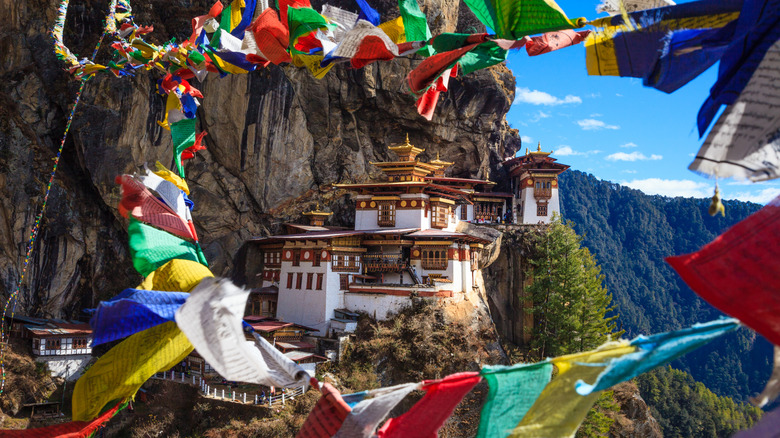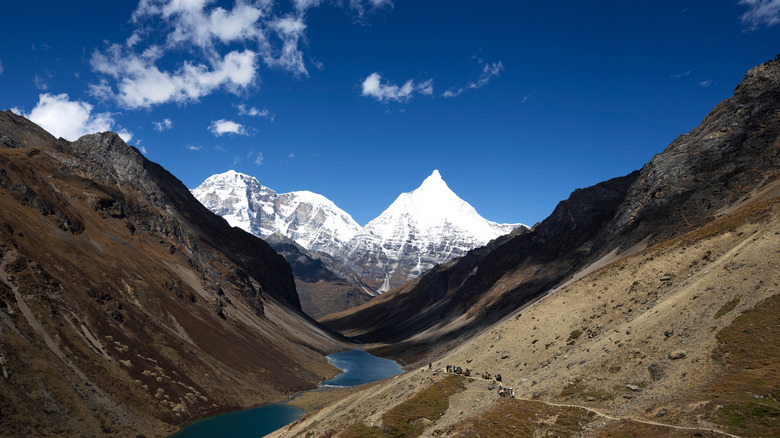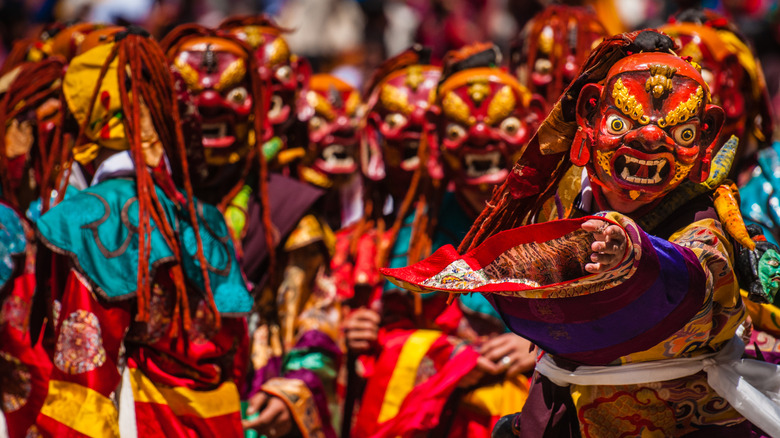The World's Most Mountainous Country Is A Pristine Peak-Filled Wonderland For Any Adventure Lover
Landlocked in the eastern Himalayas, Bhutan is the most mountainous country in the world. According to the Norway-based non-profit GRID-Arendal, the country's towering, otherworldly peaks cover over 98% of its surface, making it a premier destination for adventure seekers looking to trek through some of the most demanding and rewarding landscapes on the planet. The country's uniquely dramatic setting transforms ordinary activities like camping and cycling into borderline magical experiences.
Outdoor and culture lovers will lean into extreme and quintessentially Bhutanese experiences in this country. Travelers can take obscenely beautiful helicopter tours through the mountains, go glacial rafting past ancient monasteries, and watch archery competitions where rivals drink wine and try to distract their opponents by dancing around the target. Measuring its progress through metrics like Gross National Happiness, Bhutan has embraced modernity on its own terms, prioritizing the well-being of its people and its environment. These measures include a daily tourism tax fee of $100 (down from $200 in 2023) for international visitors in 2024. These funds go towards sustainable tourism efforts.
This steep fee means the country isn't easily accessible to everyone. Neither the Bhutanese people nor those who have had the privilege of visiting wish to see the country inundated with throngs of tourists impacting the local and cultural environment. However, if you're willing to pay the tax and travel with respect and consideration, you'll access a natural backdrop like no other.
Bhutan's trekking and outdoor adventures
Visitors come to Bhutan with its world-class trekking in mind, but independent hiking in the country is strictly prohibited. You'll have to set up your outdoor adventuring with an accredited tour operator or guide, but it's still a good idea to remember these safety tips before your first solo hike. While planning with a guide might seem inconvenient, it's more than worth the trouble, as the beauty of Bhutan's diverse natural landscape is difficult to overstate.
Notable hikes include the Druk Path trek — a six-day hike that leads visitors through alpine lakes and forests, connecting Thimphu, Bhutan's capital, with the historic valley town of Paro. The Dagala Thousand Lakes trek, famous for its high-altitude meadows and glistening mountain lakes, is another highlight. Extreme adventure seekers will be interested in the Snowman Trek, a 186-mile odyssey that takes visitors through 11 mountain passes (several at over 22,000 feet) in the country's most remote regions. Hiking in Bhutan is no joke, and the Snowman Trek is regarded as one of the most difficult and rewarding in the Himalayas. As such, it's only recommended for seasoned outdoor adventurers.
The country also has several impressive national parks and a thriving eco-tourism scene. Bhutan's landscape is home to several rare and endangered animal species like the black-necked crane, red panda, and golden langur. Visitors can explore Jigme Singye National Park to see Bengal tigers, while bird lovers should head to Royal Manas National Park, which features more than 365 avian species.
A cultural landscape like no other in Bhutan
Bhutan's cultural heritage and identity are as distinct as its geography. The country recognizes Buddhism as its official religion, with many of its people following the Kagyu school of Mahayana Buddhism. The landscape is dotted with ancient dzongs (fortress monasteries) and temples, many of which are perched atop cliffs. The country's iconic Paro Taktsang (Tiger's Nest) Monastery sits on a sheer cliffside 10,000 feet above sea level.
Every year, the country celebrates Tshechu, a religious festival sometimes referred to as the Mask Dance Festival. This event honors Guru Rinpoche, the religious teacher credited with introducing Buddhism to Bhutan in the 8th century. Celebrations occur at sacred sites throughout the country, featuring dancing, battle reenactments, and local delicacies. Visitors to monasteries and other sacred locations hosting these celebrations are encouraged to maintain a respectful and nondisruptive demeanor while observing them, so make sure you know the unspoken etiquette rules before visiting a Buddhist temple.
Bhutan's defining characteristic might just be its level of commitment to the conservation of its culture and environment. This refreshing outlook ensures that over-tourism doesn't compromise the country's natural or spiritual wealth. If you're looking for more distinct experiences in the Himalayas once you've checked Bhutan off your list, consider heading to the world's highest hotel that boasts unmatched views of the world's tallest mountain.


